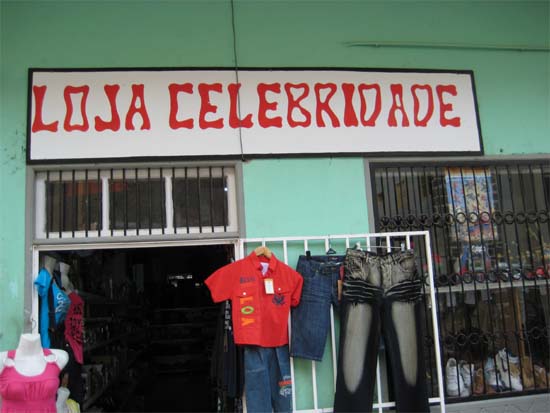
Surveyors for the four-month pilot project counted 15 Chinese-owned stores in the town of Ribeira Grande – population 20,000 – on Santo Antão Island. The community was chosen because 69 of 117 interviewed youths approved of condom sales in Chinese shops, with only 31 against the idea. One-third of surveyed youths nationwide who opposed the idea listed as their reason the “bad quality of Chinese products.” Organisers thought the biggest challenge would be convincing youths of condom quality and getting them to pay when condoms are free at state health centres, said Peace Corps volunteer Alper. More than 6,000 condoms are distributed to health centres every month in Ribeira Grande, according to the government. But it was the Chinese shop owners who needed convincing first. “First we sent them letters in Portuguese with the condom sales pitch. No response. Then a Chinese translation of the letter. Still no response,” said Alper. “The [local] non-profit VerdeFam organised a training. No one attended. Finally, we just went door-to-door to convince them [shop owners] that this was a good business decision.” Seven owners agreed. They keep half the purchase price, while VerdeFam gets the other 5 US cents per sale, according to Alper. Shop owner Qing Guo Shen, 30, told IRIN he was at first undecided because he did not want to commit to stocking condoms if he had to pre-pay for them and face the risk they might not sell. But since 20 January, Shen added packets of three subsidised condoms for 10 cents to his inventory, alongside slippers and pencils, imported sundresses and toys. When asked what changed his mind, he said: “I wanted to help someone.” Alper said the owners responded favourably when they learned they could return unsold condoms at any point without penalty.
US Peace Corps volunteers working with a local NGO in Cape Verde have recruited people close enough to youths to sell them condoms, but distant enough to not talk about their condom purchases: Chinese shop owners
CAPE VERDE: Can Chinese shop owners increase condom use?
Caption: Chinese shop in Cape Verde that has agreed to sell condoms
© Alex Alper/IRIN
DAKAR, 17 February 2009 (IRIN) - Sometimes knowledge just is not enough.
Despite the fact most sexually-active youths in Cape Verde know where to get free condoms, more than 30 percent are not using them, according to a 2006 government survey. US Peace Corps volunteers working with a local NGO have recruited people close enough to youths to sell them condoms, but distant enough to not talk about their condom purchases: Chinese shop owners.
In a recent nationwide survey conducted by the volunteers, 25 percent of 424 surveyed youths responded they did not pick up condoms because of “embarrassment.” Surveyor Alex Alper told IRIN her team hoped the solution was just around the corner - in neighbourhood Chinese-owned stores.
Alper said these stores offer more anonymity than public health centres that dispense free condoms. “The Chinese community in Cape Verde has purely commercial relations with locals. Their stores are everywhere, but the Chinese are socially separate.”
As the Chinese population in Cape Verde increased in the late 1990s, researchers documented the spread of their small shops selling cheap imports, mostly on the islands of Santiago and São Vicente.
There are approximately 300 Chinese-owned stores as of February 2009, according to the Chinese embassy in Cape Verde. Embassy officials told IRIN more than half of the 1,500 Chinese residents on the islands work in small businesses.
Chinese buy-in
Surveyors for the four-month pilot project counted 15 Chinese-owned stores in the town of Ribeira Grande – population 20,000 – on Santo Antão Island. The community was chosen because 69 of 117 interviewed youths approved of condom sales in Chinese shops, with only 31 against the idea.
One-third of surveyed youths nationwide who opposed the idea listed as their reason the “bad quality of Chinese products.”
Organisers thought the biggest challenge would be convincing youths of condom quality and getting them to pay when condoms are free at state health centres, said Peace Corps volunteer Alper. More than 6,000 condoms are distributed to health centres every month in Ribeira Grande, according to the government.
But it was the Chinese shop owners who needed convincing first.
“First we sent them letters in Portuguese with the condom sales pitch. No response. Then a Chinese translation of the letter. Still no response,” said Alper. “The [local] non-profit VerdeFam organised a training. No one attended. Finally, we just went door-to-door to convince them [shop owners] that this was a good business decision.”
Seven owners agreed. They keep half the purchase price, while VerdeFam gets the other 5 US cents per sale, according to Alper.
Shop owner Qing Guo Shen, 30, told IRIN he was at first undecided because he did not want to commit to stocking condoms if he had to pre-pay for them and face the risk they might not sell.
But since 20 January, Shen added packets of three subsidised condoms for 10 cents to his inventory, alongside slippers and pencils, imported sundresses and toys. When asked what changed his mind, he said: “I wanted to help someone.”
Alper said the owners responded favourably when they learned they could return unsold condoms at any point without penalty.
Risk
Cape Verde had an HIV infection rate of less than one percent as of December 2007, but the head of the National Coordinating Committee to Fight AIDS told IRIN he suspected infections are on the rise.
“We have put much emphasis on prevention to keep the infection rate low. But we are a country that is becoming more and more open,” said committee executive secretary José Antonio Dos Reis. “We are at the crossroads of tourism, immigration and risky behaviours.”
The committee head noted a high number of islanders who report multiple sexual partners, 40 percent for women and 69 percent for men, based on a 2005 government study.
Alper told IRIN it is still too soon to know what if any impact condoms at the corner store will have on usage. “We do not know if people value privacy enough to pay for condoms. And even though Chinese stores offer relatively more anonymity than health centres, there are still Cape Verdeans who work in these stores.”
For shop owner Shen, it is still too early to know whether his newest store item will be profitable. “So far, only men have bought the condoms. It [sales] varies during the week. We will wait and see.”
pt/np












